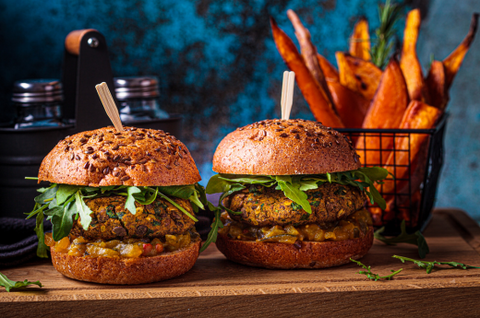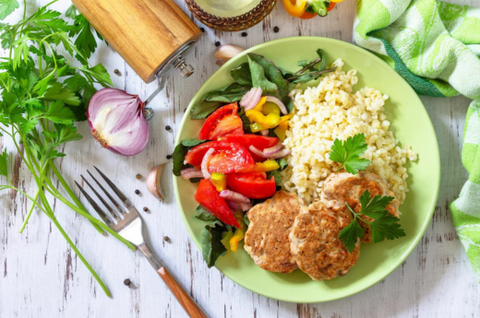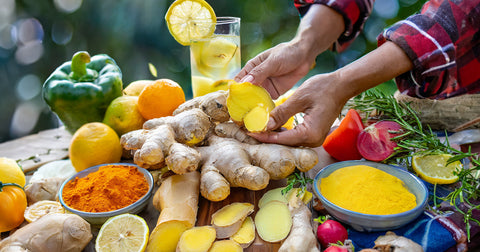Are you considering transitioning to a more plant-based diet? It can seem like an overwhelming task, but don't worry! With some planning and dedication, you'll be able to make the transition from carnivore to herbivore. You don't have to give up meat cold turkey; think of it as making gradual changes that will eventually lead to becoming vegan or vegetarian.
In this post, we'll explore how you can begin your journey in a sustainable way and provide useful tips on what lifestyle changes you need to make while sticking with it. Let's get started on this exciting adventure — it may just open up new possibilities for your health and well-being!

Understanding the Difference Between a Carnivore and Herbivore Diet
Ever wonder why some animals eat only plants while others devour meat? It's all about their diet. Herbivores are animals that eat mostly plant-based meals, while carnivores survive on a diet of meat. But it's not always easy to tell the difference just by looking at an animal. Take the mighty bear, for example.
These adorable creatures might seem like herbivores, but they're actually classified as carnivores. Confusing, right? Whether you're a nature lover or just curious about animal diets, understanding the difference between a carnivore and herbivore diet is not only fascinating but also essential. So, let's dive into this topic and see what we can learn.
The main difference between a carnivore and herbivore diet lies in the type of food eaten. Carnivores eat only meat, while herbivores consume primarily plants. Vegans are individuals who completely avoid all animal products including meat, dairy, eggs and honey. They obtain their nutrients from plant-based sources such as grains, legumes, fruits, and vegetables. A vegan diet is rich in fiber, vitamins, minerals and phytochemicals; it can be a healthy and balanced way of eating. It is important to choose a variety of foods from the five food groups (grains, legumes, vegetables, fruits and nuts) for optimal health. Eating a plant-based diet may reduce the risk of certain chronic illnesses and provide many benefits, including weight management. It is important to note that a vegan lifestyle is not only about food but also extends to avoiding items made from or tested on animals, such as cosmetics and clothing. Ultimately, it’s up to each individual to determine which dietary path they prefer. Whether vegan, vegetarian or carnivore, it’s important to eat a balanced and nutritious diet.

Identifying Your Reasons for Transitioning to a Vegan-Friendly Diet
Transitioning to a vegan-friendly diet can feel daunting at first, but taking the time to identify your reasons for doing so can help make the process more manageable. Perhaps you're concerned about the environmental impact of animal agriculture, or maybe you're looking to improve your overall health and well-being.
Whatever your motivation, it's important to have a clear understanding of why you're making this shift in order to stay committed in the long run. Plus, once you start exploring all of the delicious plant-based dishes out there, you might find that the switch isn't as difficult as you initially thought. So go ahead, do some research and figure out what's driving your desire to go vegan. Your body and the planet will thank you for it!

Researching Delicious and Nutritious Plant-Based Recipes
When it comes to cooking plant-based meals, it can be challenging to come up with delicious and nutritious recipes. That's where research comes in! By scouring the internet, cookbooks, and even talking to other vegans, you can find a plethora of amazing plant-based recipes to try out. Not only will you be nourishing your body with healthy plant-based ingredients, but you'll also be able to satisfy your taste buds with flavorful meals.
When searching for delicious and nutritious plant-based recipes, veganism is often the best place to start. This lifestyle utilizes only plant-based ingredients to create flavorful dishes without the use of animal products. Not only is it healthful, but vegan cuisine can be creative, exciting, and satisfying. From tempeh tacos to quinoa stir fry, vegans have a wide variety of recipes to choose from. By scouring the internet, cookbooks, and even talking to other vegans, you can find a plethora of amazing plant-based recipes that are as delicious as they are nutritious. With veganism becoming increasingly popular, there's never been a better time to give these kinds of recipes a try. So next time you're looking to create something delicious and nutritious, consider trying out a plant-based recipe! You're sure to find one that's both tasty and healthy.
Plus, experimenting with different recipes can be fun and exciting – who knows, you might just discover a new favorite dish! So, don't be afraid to dive into the world of plant-based cooking and start researching some delicious recipes today.

Strategizing Meal Planning and Shopping Habits
Meal planning and grocery shopping can feel like a daunting task, but with a little bit of strategizing, it can actually be enjoyable! First things first, take inventory of your pantry and fridge to see what you already have on hand. This will not only save you money but also prevent food waste. Next, plan out your meals for the week based on what you can make with the ingredients you already have and what you need to buy. Make a shopping list to stay focused at the store and avoid impulse purchases.
Finally, consider buying in bulk or choosing generic brands to save even more money. With a little bit of planning, you can save money, reduce food waste, and ensure that you and your family are eating nutritious and delicious meals.

Eliminating Ingredients From Your Kitchen That Don’t Support a Vegan Lifestyle
As more people switch to a vegan lifestyle, it's important to take a closer look at the ingredients in our kitchens. Eliminating non-vegan items can be daunting, but it doesn't have to be. Start by reading labels and identifying ingredients such as meat, dairy, and eggs. Finding substitutes for these items is key.
One of the most important steps in creating and maintaining a vegan lifestyle is to eliminate non-vegan ingredients from your kitchen. This can be accomplished by reading labels carefully to ensure products are free of animal derivatives such as dairy, eggs, honey, and gelatin. Additionally, look for any hidden sources of animal products like monoglycerides (often derived from animal fat) or food coloring that contains carmine (a red dye made from crushed insects). For example, swapping cow's milk for almond or soy milk, or using a tofu scramble instead of scrambled eggs. Don't forget to check your condiments and snacks, too. Some may contain hidden animal products.
When grocery shopping for vegan items, always opt for whole foods that are naturally plant-based and minimally processed. Examples include fruits, vegetables, legumes (beans, peas), nuts and seeds. Look for packaged foods with the “Certified Vegan” label; these have been reviewed by a vegan organization and are free of animal-based ingredients.
Finally, make sure to take stock of your kitchen staples like cooking oils, condiments, seasoning blends and canned goods. Replace any non-vegan items with vegan alternatives such as vegan butter, vegetable broth or nutritional yeast. Making these changes can be beneficial not only for personal health but also for the planet and animal welfare. Plus, experimenting with new ingredients and recipes can be fun and delicious!

Figuring Out Where to Find Nutritional Information
When it comes to making healthy choices, having the right nutrition information at your fingertips is key. But with so many sources out there, it can be tough to know where to find reliable information. As a self-proclaimed foodie, I've stumbled upon some great resources in my quest for balanced meals. One of my go-to is the nutrition label on packaged foods. It may seem obvious, but taking a few minutes to scan the label can reveal a wealth of information about what's inside.
Another great source? The internet! There are plenty of reputable websites that offer expert advice on healthy eating, from nutritionists to dietitians. And if you're someone who's always on the go, many restaurants and fast food chains now offer nutritional information on their menus or online. So no matter what your situation, rest assured that the information you need to make smart choices is out there – you just have to know where to look!
It is possible to transition to a vegan lifestyle without compromising your nutritional needs. Having an understanding of what it means to be vegan, being aware of why you are transitioning, finding recipes that fill your heart and stomach with joy, and taking control of meal planning and shopping will all help as you navigate the vegan lifestyle. Once you have your kitchen stocked with what you need for healthy plant-based meals and snacks, don't forget to look up nutritional information and create delicious meals that bring pleasure not just to yourself, but those around you.
Whether you go all in or make small changes depending on your individual needs and level of motivation, going vegan can be an incredibly rewarding experience. Give yourself permission to make mistakes while learning, eat well-nourishing foods that bring laughter to mealtimes, study labels diligently when shopping, and most importantly - stay consistent each day so that this becomes an integral part of who you are.
Frequently Asked Questions
How do I start living vegan?
Do not eat animal products if the majority of your food is vegan. If you want more variety, cut out or replace an ingredient at the same time.
Is being vegan a healthy lifestyle?
A vegan diet is healthier because of its high fiber and high cholesterol than omnivore food. According to a number of studies, Vegans are less likely than other types of diets to develop heart and lung conditions and help manage type 2 diabetes and prevent a variety of other diseases.
What is the lifestyle of a vegan?
Vegan life involves stopping everything in which one is forced to exploit a living animal if it's practical. Naturally that means avoiding eating animal foods, as well as taking care of clothes, makeup and a variety of other aspects of life.
What is an egg substitute?
Vegan egg substitutes are ingredients that can be used to replace eggs in baking and cooking. Common vegan egg replacements include ground flaxseeds, tofu, mashed bananas and applesauce.
What are good recipe substitutions for eggs?
Some vegan recipes that don't require eggs are sometimes substituted with ground flaxseed, mashed bananas and applesauce. These are all popular egg replacements in baking. You can also try puréed silken tofu or a commercial egg replacer like Ener-G Egg Replacer.
Is vegan egg-free?
Yes, vegan egg substitutes are egg-free alternatives used in recipes. There are various options for vegan egg replacements such as flaxseed meal, aquafaba, bananas, applesauce, chia seeds, and baking powder and oil, among others. These substitutes work well in recipes that require eggs and offer a moistness and binding effect similar to eggs. Whether you're baking cookies, cakes, or pancakes, there is a vegan egg substitute to choose from.
What foods are vegan?
Veganism is a lifestyle where individuals do not consume or use animal products. This lifestyle is beneficial since it is generally associated with healthier eating habits and an overall reduction of environmental impact. Eating vegan also gives people access to a variety of foods that are rich in essential nutrients, vitamins, and minerals.
There are many nutrient-dense vegan sources of protein, carbohydrates, and fats that can provide a healthy and balanced diet. Some excellent sources of plant-based proteins include legumes, tofu, tempeh, lentils, black beans, chickpeas, quinoa, nuts, and seeds. Complex carbohydrates like brown rice, whole breads and cereals can give you energy while still providing valuable nutrition to the body. Lastly, healthy fats such as those found in avocados, olives, coconut oil, nuts and seeds are great for adding flavor to meals while still being beneficial for your body's overall health.
When it comes to fruits and vegetables it’s important to eat a wide variety of them for maximum nutrition benefit. Dark leafy greens like kale and spinach contain large amounts of calcium and Vitamin C along with other phytonutrients that protect the body from illnesses like cancer. Colorful fruits such as oranges or blueberries have anti-inflammatory properties that can help fight infections as well as providing antioxidants for better skin health. Additionally there are plenty of vegan alternatives for dairy products such as soy milk or almond milk which also contain many important vitamins and minerals like calcium and B12 which would otherwise be found in traditional dairy products.
Finally when preparing vegan meals it’s important to focus on fresh ingredients instead of processed food items whenever possible - this will ensure maximum nutrient benefits from your meal while providing the best flavors! To enhance flavors in a vegan meal try adding herbs such as cilantro or basil or spices like cumin or turmeric which can all add flavor without added calories or fat content. Cooking methods like grilling vegetables over high heat can caramelize food items while still retaining important vitamins within them - discovering new techniques for vegan cooking can make any simple dish into something truly amazing!
What does a vegan eat?
Veganism is a lifestyle that avoids the use of all animal products and byproducts, including food, clothing, and other items made from animals. This lifestyle has become increasingly popular in recent years due to its many health benefits and its focus on reducing the environmental impact created by animal agriculture.
People may choose to pursue a vegan diet for a variety of reasons - some are motivated by ethical concerns related to animal cruelty or environmental impact, while others may be driven by health benefits or personal preference. It is important to note that veganism is more than just avoiding meat - vegans also refrain from consuming eggs, dairy products, honey, gelatin, whey protein, lard and any other animal-based products.
A vegan diet typically consists of fruits, vegetables, beans/legumes, nuts/seeds, grains/cereals, and plant-based oils such as coconut oil or olive oil. To ensure you’re getting all the nutrition your body needs it’s important to eat a variety of foods from each of these categories in recommended portion sizes. Some excellent sources of vegan proteins include tofu/tempeh/beans/lentils/nuts & seeds while carbohydrates like brown rice or quinoa can provide valuable energy while still supplying important vitamins & minerals. Lastly non-dairy alternatives like soy milk or almond milk can provide vegans with calcium and B12 which are normally found in traditional dairy products.
There are a number of potential health benefits associated with following a vegan diet such as improved heart health due to reduced saturated fats as well as increased fiber intake which can help reduce cholesterol levels. Vegans may also potentially experience weight loss since eating caloric dense processed animal products like cheese or bacon could often be replaced with nutrient dense plant sources like veggies & fruits which have fewer calories per serving size. Additionally studies have shown that following a vegan diet can help reduce inflammation within the body thereby improving overall wellness for people who suffer from autoimmune diseases & chronic illnesses.
It is important to note that there are certain potential risks associated with switching over to a vegan lifestyle – even though it offers ample nutrition if done correctly there is always risk associated with inadequate protein consumption & vitamin deficiency if certain foods aren't being included in one's meals regularly enough (for instance B12 which isn't found in large amounts within plants). Additionally vegans need to be careful when choosing food items since some processed foods (like Oreos) are accidentally vegan but do not contain any nutritional value whatsoever so should not be considered part of one's diet regardless! By developing healthy behaviors & carefully selecting appropriate food choices it is absolutely possible for anyone to follow the vegan lifestyle without putting their own health at risk!
What is vegan meals?
Vegan meals are meals that contain no animal products or by-products. This includes foods like meat, fish, eggs, dairy, honey, and gelatin. Instead vegan meals focus on plant-based ingredients such as fruits, vegetables, legumes (beans & lentils), nuts/seeds, grains/cereals, and plant-based oils like coconut oil or olive oil. To ensure you’re getting all the nutrition your body needs it’s important to eat a variety of foods from each of these categories in recommended portion sizes. Additionally some vegans may choose to include non-dairy alternatives for items like milk & cheese which provide similar nutrients without any animal sources.






Comments (1)
Muchas gracias por esta detallada información. Ha sido de gran ayuda para mi y mi familia, ya que estamos explorando el hecho de sustituir los alimentos de origen animal por los vegetales gracias a un par de documentales sobre el tema en sí.